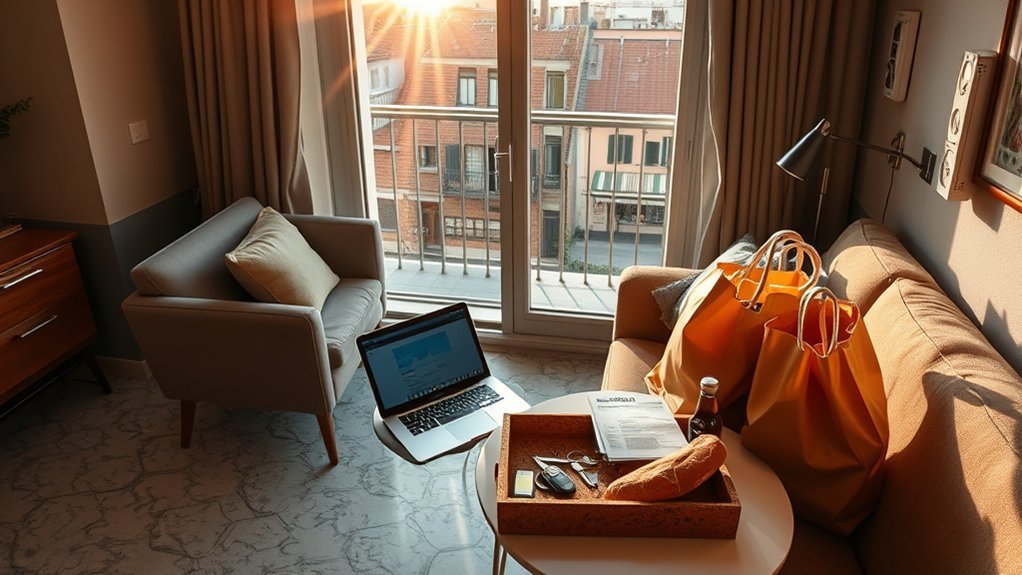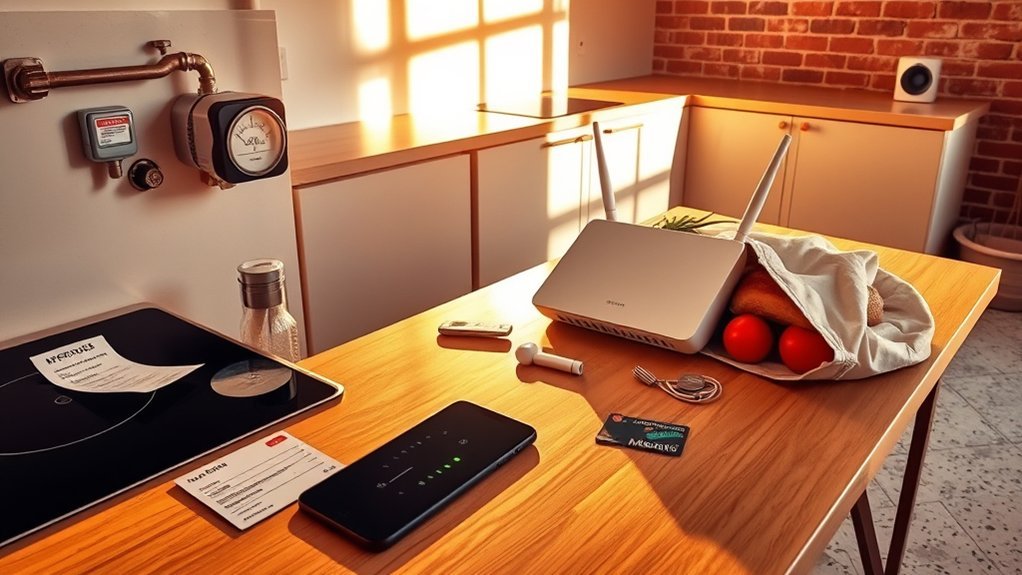You’ll typically need about €1,767–€2,166 a month as a single person in Madrid, with rent the biggest variable: expect roughly €1,000 for a one‑bed outside the centre or €1,300–€1,368 in central neighbourhoods. Monthly living costs beyond rent average around €745 (groceries, transport, utilities, internet, occasional dining out). Utilities and internet add €180–€220; public transport passes €39–€55. Keep reading for neighbourhood tips, saving tactics and childcare or buying costs.
What You’ll Spend Monthly in Madrid: A Realistic Budget Breakdown

Although individual choices matter, you can expect a realistic monthly budget in Madrid to land between about €1,767 and €2,166 for a single person depending on rent.
You’ll see monthly costs split into rent, groceries cost, and bills: monthly rent in Madrid is the largest variable — around €1,368 for a 1‑bed in the city centre or €1,001 outside centre — so choosing location changes totals materially.
Expect basic utilities for an 85 m² place to add about €150–€172 and internet/phone €30–€45, so budget roughly €180–€220 for bills.
Monthly living costs excluding rent average ≈€745, covering groceries, transport and occasional eating out.
Groceries typically run €200–€300 monthly; common prices include milk €1/L, bread €1.40 (500g) and chicken €7.80/kg.
Use these concrete figures to model scenarios: centre 1‑bed, outside 1‑bed, or shared housing to hit the budget range you need.
Renting in Madrid: Prices, Neighbourhoods, and How to Find a Place

You’ll find big price gaps by neighbourhood: expect about €1,368/month for a 1‑bed in the centre versus €1,001 outside, with Salamanca, Chamberí and Retiro at the top and Malasaña or La Latina pricier for trendier options while Villaverde and parts of Lavapiés are cheaper.
Start searching early (May–September busiest) on Idealista and Spotahome, use Uniplaces/ Airbnb/Beroomers for short stays and Badi or Facebook groups for student rooms, and contact landlords by phone/WhatsApp with documents ready.
Always check the lease for community fees, utilities, deposit terms, consider an experienced reviewer, and stick to verified listings to avoid scams. Additionally, understanding the cost-effectiveness of local amenities can help you make informed decisions about where to rent in the city.
Neighbourhoods and Prices
When budgeting for rent in Madrid, expect a clear split between centre and outskirts: a one‑bed in the city centre averages roughly €1,300–€1,368/month versus about €1,000–€1,001 outside, while three‑bed flats run about €2,289 in the centre and €1,625 outside. You’ll find prime neighbourhoods like Salamanca, Chamberí and Retiro carry premium prices, while Malasaña and La Latina are trendy picks that can still be costly. Less desirable areas such as Villaverde and Lavapiés tend to be cheaper but check safety and services.
| Neighbourhood type | Examples | Typical cost |
|---|---|---|
| Prime centre | Salamanca, Chamberí | High |
| Trendy | Malasaña, La Latina | Medium-High |
| Budget/outskirts | Villaverde, Lavapiés | Lower |
Use online portals and direct contact to compare average monthly rent quickly.
Searching and Document Checklist
Start your search with a clear budget and zone priority — a one‑bed in central Madrid averages €1,300–€1,368/month versus about €1,000 outside, and three‑beds run roughly €2,289 (centre) to €1,625 (outskirts) — then use top portals (Idealista, Spotahome; short‑term: Uniplaces, Airbnb, Beroomers) and flatshare sites (Badi, Facebook groups) to scan listings.
Start searches in May–June for autumn demand, contact landlords by phone/WhatsApp, and book several viewings in one week.
Have key documents ready to speed approval: NIE or passport, proof of income, payslips/bank statements, references and deposit.
Check contracts for fees, utilities, length and inventory; use a Spanish‑speaker or broker to avoid illegal clauses.
- Prepare NIE/passport and income proof
- Target preferred zones and set max rent
- Use Idealista/Spotahome first
- Schedule multiple viewings quickly
Buying Property: Prices per Square Metre, Mortgages, and Legal Costs

Although prices vary widely across the city, expect to pay about €5,930/m² in central Madrid and roughly €3,635/m² in outer districts, with purchase-related costs adding another 6–10% for resale homes (transfer tax) or about 10% VAT for new builds plus notary, land registry and legal fees.
Expect roughly €5,930/m² central, €3,635/m² outer Madrid, plus 6–10% transfer tax or ~10% VAT and fees
You should budget purchase-related additional costs into your affordability calculations and check the Land Registry before committing.
Property prices per m² guide neighbourhood choice, but factor in size, condition and community fees.
If you’re a non-resident, a mortgage for non-residents usually requires a 30–40% deposit because banks offer lower LTVs; terms are generally better for EU residents.
Shop multiple banks or brokers to compare rates and ask for illustrative repayment schedules.
For investments of €500,000+, confirm Golden Visa eligibility and get professional legal advice to verify title, encumbrances and tax implications.
Use a bilingual lawyer or gestor to handle contracts, notary appointments and registration to reduce risk and unexpected costs. Additionally, understanding the essential fees associated with hiring a lawyer can help you avoid hidden costs and ensure a smoother transaction.
Utilities, Internet, and Mobile Plans: Typical Bills and Savings Tips

After you’ve budgeted for purchase costs and monthly mortgage or community fees, factor in running costs: for an 85 m² apartment expect basic utilities (electricity, heating/cooling, water and garbage) to average €156–€172 per month, internet plans with fiber (60 Mbps or more, unlimited) to run about €29–€31, and mobile plans with ~10GB+ data and calls around €14–€16.
You’ll want to shop providers and optimise usage: compare energy firms (Iberdrola, Endesa, TotalEnergies) and choose off‑peak or dual‑rate electricity to lower bills.
Look at bundle deals for home internet and mobile phone plans from Movistar, Avatel or smaller operators like Pepephone and Energy Nordic to cut combined costs.
Practical steps:
- Review annual promotions; first‑year home internet offers can be cheaper.
- Combine services into a single bill to reduce monthly fees.
- Shift high‑consumption tasks (laundry, heating) to off‑peak hours.
- Compare mobile phone plans for EU roaming and data caps.
- Regular maintenance of utilities can help prevent unexpected increases in costs.
These measures keep utilities predictable and trim your monthly living cost.
Groceries and Eating Out: Supermarkets, Markets, and Average Prices

Groceries in Madrid are affordable if you shop smart: a single person typically spends €200–€300 a month while a family of four spends about €700–€800.
You’ll find major supermarket chains like Mercadona, Carrefour and Alcampo, plus discount options Lidl and Aldi, where staple prices are clear: milk €1/L, bread €1.40–€1.50 (500g), rice €1.50/kg, eggs €2.90/12, chicken fillets €7.30–€7.80/kg and beef €13–€15/kg.
For fresher produce and specialty items, buy weekly at mercados — Mercado de la Cebada or Mercado San Miguel often offer better quality and seasonal prices.
Eating out remains reasonable: Menu del Día €10–€15, three-course for two €45–€60, cappuccino €2–€2.80.
To cut costs, use discount supermarket chains, bulk or wholesale buys, and shop markets near closing time for deals.
Track your receipts and plan meals around promotions to keep monthly groceries within budget.
Transport, Leisure, and Daily Expenses: Commuting and Lifestyle Costs

Typically, commuting in Madrid stays affordable if you use public transport: a monthly metro/bus pass runs about €39–€55 (Zone A ≈ €54.60), single tickets cost €1.50–€2.50, and a 10‑trip pack is roughly €12.20.
Commuting in Madrid is affordable with public transport: monthly passes €39–€55, singles €1.50–€2.50, 10‑trip ≈ €12.20
You’ll find the public transport system efficient for daily travel; get a monthly transport pass if you commute regularly. Cercanías regional train passes for suburbs are pricier, so budget accordingly.
- Taxis: base ≈ €2.50 + €1.10/km day; nights/Sundays ≈ €3.15 base — good for short trips but costlier than a monthly pass.
- Leisure: cinema ≈ €10, gym ≈ €40–€50/month, mid‑range dinner for two ≈ €60.
- Daily small spends: coffee €1.50–€2.50, beer ≈ €3.50; many museums €7–€15 or free at set times.
- Suburban commuting: Cercanías quarterly/zone passes vary widely (e.g., zones 1–2 ≈ €87.75 quarterly), so plan expenses by zone. Additionally, regular software updates can help prevent malfunctions in devices used for navigating transport options.
Childcare and Education: Nursery, School Fees, and Financial Supports

You’ll find nursery options in Madrid range from heavily subsidized public places at about €150–€200/month (standard 9:00–13:00 with paid extensions) to private nurseries around €300+ and full-day private preschool near €527/month.
For school-age kids, public education is free while “concertado” centres typically charge €100–€200/month and international schools can run from roughly €5,000 up to €21,000 per year depending on curriculum and level.
To lower costs, make sure you have required documents for public enrolment (birth certificate, DNI/NIE), apply during April–June windows, and claim available tax deductions and parental credits that can total around €1,000/year. Additionally, exploring government grants can provide financial support for families seeking childcare options.
Nursery Costs and Options
Although public municipal nurseries are heavily subsidized, many families weigh them against private and concertado options based on cost, hours and extras.
You’ll find public nurseries cost roughly €150–€200/month for 0–3, typically 9:00–13:00 with optional extensions to ~17:00 for extra fees.
Private nurseries average €300+/month; high‑end or international programs cost more.
Centros concertados sit around €100–€200/month, often excluding meals and extras.
Enrollment requires a birth certificate and a parent’s DNI/NIE; applications peak April–June and places are allocated by demand.
- You can expect shorter standard hours in public nurseries unless you pay for extensions.
- Private nurseries offer longer hours and premium services at higher childcare costs.
- Concertados balance cost and flexibility.
- Tax deduction up to €1,000/year and local subsidies help low‑income families.
Public Vs Private Schools
When choosing between public, concertado and private early‑education options in Madrid, weigh hours, fees and available supports: public nurseries are heavily subsidized (about €150–€200/month for 0–3, standard 9:00–13:00 with paid extensions to ~17:00), concertados typically fall in the €100–€200/month range (often excluding meals), and private preschools average roughly €527/month while international schools run from about €3,950 to over €20,000/year; working parents can offset costs with a tax deduction up to €1,000/year and local subsidies, and public enrollment requires a birth certificate and a parent’s DNI/NIE with applications peaking April–June.
You’ll find public nurseries best for lower cost and core hours; private nurseries give flexibility and services at higher prices. International Schools suit expatriates needing curricula continuity but cost substantially more.
Financial Aid and Tax Breaks
After weighing hours, costs and supports between public, concertado and private options, you’ll want to check what financial help you can actually claim and when to apply.
You’ll find public nurseries cost roughly €150–€200/month (standard 9:00–13:00; extended hours extra) and subsidized places are limited, so early application matters.
Claim the childcare tax deduction up to €1,000/year if you’re eligible and keep DNI/NIE, birth certificate and income proof ready.
- Public nurseries: government-subsidized, lower monthly fees, apply Apr–Jun for places.
- Centros concertados: €100–€200/month, may exclude meals/extras.
- Private nurseries: €300+/month; private preschools ~€527/month.
- International schools: wide tuition range; ask about scholarships and sibling discounts.
Frequently Asked Questions
What Is the Average Cost of Living in Madrid?
You’ll pay about €1,767 monthly on average in Madrid; neighborhood vibes, public transport, and weekend activities affect costs. Expect €745 living expenses excluding rent, higher rent in centre, plus utilities, groceries and transit.
How Much Do You Need to Live Comfortably in Madrid?
You’ll need about €2,166/month as a single and €5,110 for a family of four; adjust for neighborhood vibes, transport costs, leisure budget, and lower rent outside center to save several hundred euros monthly.
Is $50,000 Euro a Good Salary in Madrid?
Want comfort and choices in Madrid? You’re earning well: €50,000 covers living, allows savings, private health, and leisure. Consider career opportunities, tax implications, and lifestyle inflation to guarantee long‑term goals and family needs stay realistic.
Is 1000 Euros a Month Enough to Live in Madrid?
No — €1,000 won’t realistically cover studio apartments plus living costs; you’d need shared rooms, cut nightlife expenses, skip language classes or find free options, and rely on tight budgeting and subsidies to survive short‑term.
Conclusion
You’ll find Madrid’s costs are lower than some expect but higher than Spain’s smaller cities — a mix that’s easy to verify by comparing rental listings and supermarket receipts. If you’re budgeting, test the theory that central living means double convenience but not double cost: you’ll likely pay more for rent yet save on transport and time. Use real quotes for rent, utilities and groceries to plan precisely and avoid surprises.


